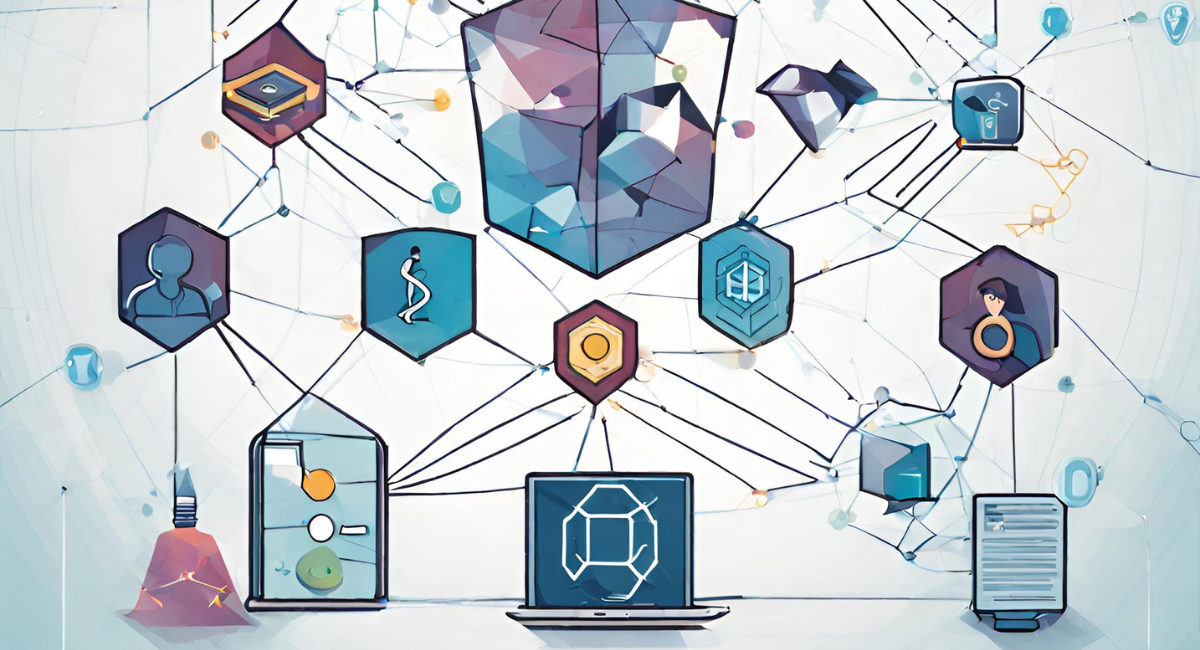Decentralization in blockchain enhances security by distributing data across multiple nodes, making it resistant to tampering and attacks. It also bolsters data privacy by ensuring transactions are pseudonymous, with each user represented by a unique cryptographic key rather than revealing personal information.
Blockchain technology has revolutionized the way data is managed and secured. One key component contributing to its security and privacy capabilities is decentralization. By distributing data across numerous nodes or computers instead of relying on a single central authority, blockchain ensures that data is tamper-proof and resistant to attacks.
Understanding the Concept of Blockchain Decentralization

To fully comprehend the role decentralization plays in the security and privacy of blockchain, it is essential to grasp the basics of blockchain technology itself. At its core, blockchain is a decentralized digital ledger that records transactions across multiple computers. Each transaction is grouped into a block, which is then added to the chain of previous blocks, forming an immutable record.
But what exactly is decentralization within the context of blockchain?
The Basics of Blockchain Technology
Blockchain technology operates on a distributed network, where multiple participants, called nodes, maintain a copy of the blockchain. Every node validates and verifies transactions, ensuring consensus among the network. This decentralized nature eliminates the need for a central authority and reduces the risk of a single point of failure.
Now, let’s explore the intricate details of blockchain technology. When a transaction occurs, it’s sent to a network of nodes. These nodes then vie to confirm the transaction by deciphering challenging mathematical problems. The first node to crack the problem incorporates the transaction into a block and disseminates it throughout the network.
Once a block joins the blockchain, it becomes an unchangeable record component. This permanence ensures the safety of transactions, preventing modifications or interference, thus bolstering security and faith in the system. Furthermore, the decentralized structure of the blockchain ensures that all participants maintain a complete record of transactions, making it nearly impossible for any nefarious individuals to tamper with the information.
What is Decentralization in Blockchain?
In blockchain, decentralization refers to distributing authority, control, and data across the network. Instead of relying on a central entity to manage and verify transactions, blockchain decentralization empowers all participants to collectively oversee and maintain the system’s integrity. This distributed nature provides several significant benefits in terms of security and privacy.
One of the key advantages of decentralization is the enhanced security it offers. With no central authority, there is no single point of failure that hackers or malicious actors can exploit. Even if a few nodes in the network are compromised, most honest nodes can still ensure the accuracy and validity of transactions.
Moreover, decentralization promotes transparency and trust in the blockchain ecosystem. Since every participant has access to the same information, there is a shared understanding of the state of the blockchain. This transparency assists in preventing fraud and corruption, as any attempt to manipulate the data would be immediately noticeable to the entire network.
Furthermore, decentralization plays a crucial role in protecting the privacy of users. In a centralized system, personal data is typically stored in a single location, making it vulnerable to breaches and unauthorized access. In contrast, blockchain decentralization ensures that user data is distributed across multiple nodes, reducing the risk of data breaches and enhancing privacy.
Overall, the concept of decentralization is fundamental to the security and privacy of blockchain technology. By distributing authority, control, and data across the network, blockchain ensures that no single entity has complete control, making it a robust and trustworthy system for recording and verifying transactions.
The Role of Decentralization in Blockchain Security
Decentralization plays a crucial role in enhancing the security of blockchain networks. Distributing data and authority across multiple nodes makes blockchain highly resistant to attacks and manipulation.
Enhancing Security through Decentralization
Decentralization makes it extremely difficult for malicious actors to compromise the integrity of the blockchain. Unlike traditional centralized systems, where a single attack or breach can jeopardize the entire network, blockchain decentralization disperses the risk across numerous nodes, each with its copy of the ledger. This redundancy significantly reduces the vulnerability to cyber threats and ensures that no single point of failure can compromise the system’s security.
Furthermore, the decentralized nature of blockchain networks also enhances security by providing transparency and accountability. Since all transactions are recorded on the blockchain and can be accessed by anyone, detecting and preventing fraudulent activities becomes easier. This transparency is a deterrent for potential attackers, as they know that any malicious activity will be visible to the entire network.
In addition to transparency, decentralization also promotes accountability. With multiple nodes participating in the consensus mechanism, the responsibility for maintaining the integrity of the blockchain is shared among the network participants. This shared responsibility ensures that no single entity has complete control over the network, reducing the risk of corruption and manipulation.
How Decentralization Prevents Data Tampering?
A fundamental characteristic of blockchain’s decentralized nature is its unchangeability. After a transaction is documented on the blockchain, modifying or interfering with it becomes nearly unfeasible. This is made possible by the agreement protocol used by blockchain systems, in which every involved node has to confirm a transaction’s legitimacy. Changing a block would require undermining many nodes simultaneously, rendering it costly and highly unlikely.
Moreover, blockchain’s decentralized nature also ensures data integrity by eliminating the need for a central authority. In traditional centralized systems, data is stored and controlled by a single entity, making it susceptible to manipulation or censorship. However, in a decentralized blockchain network, data is stored on multiple nodes, and any changes to the data require consensus among the network participants. This eliminates the risk of a single entity altering or censoring the data, ensuring its integrity and reliability.
Furthermore, using cryptographic algorithms in blockchain technology enhances security to avoid data tampering. Each block in the blockchain contains a unique cryptographic hash, which is generated based on the data within the block. Any alteration to the data would result in a different hash value, alerting the network participants to the tampering attempt. This cryptographic integrity check ensures that the data stored on the blockchain remains secure and tamper-proof.
In conclusion, decentralization plays a critical role in enhancing the security of blockchain networks. By dispersing data and authority across multiple nodes, blockchain becomes highly resistant to attacks and manipulation. The transparency, accountability, immutability, and cryptographic integrity provided by decentralization ensure the integrity and security of the data stored on the blockchain.
Privacy Benefits of Blockchain Decentralization

Alongside its security advantages, decentralization in blockchain also offers substantial benefits in terms of privacy and data protection.
Ensuring Data Anonymity with Decentralization
One of the key privacy concerns is the exposure of personal information. However, blockchain decentralization inherently ensures a certain level of anonymity. Instead of revealing sensitive user data, blockchain transactions are pseudonymous, with each user identified by a unique cryptographic key. This provides a layer of privacy as it becomes difficult to link a particular user to their transaction history without additional information.
Privacy Control in a Decentralized System
Decentralization also empowers individuals to have better control over their data. Unlike centralized systems, where data is stored and controlled by a central entity, blockchain allows users to maintain data ownership. They can choose who has access to their information, and by leveraging cryptographic techniques, they can encrypt their data to ensure its confidentiality.
Challenges and Solutions in Decentralized Blockchain
While decentralization offers numerous benefits, it also comes with its own set of challenges. Addressing these challenges is essential to maximize decentralized blockchain systems’ security and privacy potential.
Potential Issues with Decentralized Systems
One of the primary concerns with decentralized systems is scalability. As the number of nodes rises, the network can become slower and less efficient. Additionally, ensuring consensus among the nodes and managing potential conflicts can be complex and time-consuming.
Overcoming Challenges in Blockchain Decentralization
To overcome these challenges, various solutions are being developed. Scalability can be addressed through techniques like sharding and off-chain transactions, which enable the network to handle a higher volume of transactions. Additionally, consensus algorithms, such as proof of stake, offer more energy-efficient and scalable alternatives to the traditional proof of work algorithm.
The Future of Blockchain Decentralization

As blockchain technology evolves, decentralization will become even more vital in shaping the future of security and privacy.
Emerging Trends in Decentralized Blockchain
The development of decentralized finance (DeFi) and decentralized applications (dApps) is witnessing the adoption of blockchain beyond cryptocurrencies. These advancements are pushing the boundaries of what decentralized blockchain can achieve, opening up new possibilities for secure and private interactions.
The Impact of Decentralization on Future Blockchain Developments
Decentralization will continue to be a key driver in enabling trust, security, and privacy in various sectors. Its potential extends beyond financial applications, with industries like healthcare, supply chain, and voting systems exploring the benefits of a distributed and secure network.
Key Takeaways
- Distributed Ledger: Blockchain operates on a decentralized digital ledger, recording transactions across multiple computers, ensuring data immutability and security.
- No Single Point of Failure: Decentralization means there’s no central authority, reducing the risk of a centralized attack or compromise.
- Pseudonymous Transactions: Users are identified by cryptographic keys rather than personal information, adding a layer of privacy.
- Enhanced Security: The combined efforts of multiple nodes in the network make blockchain resistant to data manipulation and unauthorized alterations.
- Future Potential: Decentralization in blockchain extends its potential to various sectors like healthcare, supply chain, and voting systems.
FAQs
What is the key advantage of blockchain decentralization?
Decentralization in blockchain disperses data across multiple nodes, eliminating a single point of failure and ensuring data remains tamper-proof.
How does decentralization promote transparency in blockchain?
Due to the distributed nature of blockchain, every participant has access to the same transaction history, making any data manipulation immediately noticeable to the entire network.
What is the role of a node in a decentralized blockchain?
Nodes in a blockchain network validate and verify transactions, ensuring consensus and maintaining an independent copy of the entire transaction history.
How does blockchain ensure user privacy?
Blockchain transactions are pseudonymous, meaning each user is identified by a cryptographic key instead of personal information, ensuring data privacy.
What challenges come with decentralization in blockchain?
Scalability is a primary concern; the network might become slower as the number of nodes increases. Achieving consensus and managing potential conflicts among nodes can also be challenging.
Conclusion
In conclusion, decentralization plays a crucial role in enhancing the security and privacy of blockchain. Distributing data and authority across numerous nodes makes blockchain highly resistant to attacks, tampering, and data breaches. Furthermore, decentralization in blockchain ensures privacy control and anonymity, allowing individuals to maintain ownership and control over their data. While challenges exist, ongoing research and development aim to address scalability and consensus issues in decentralized blockchain systems. The future of blockchain decentralization holds immense potential in transforming various industries and revolutionizing the way we secure and protect data.
